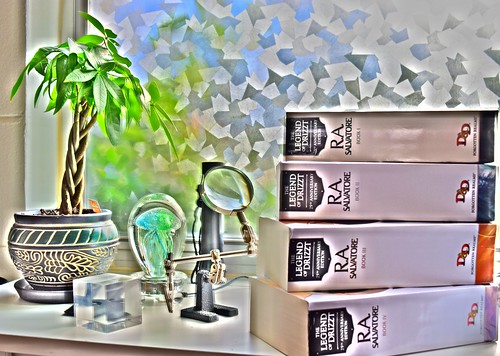 Someone asked about whether people preferred reading paper books or digital on Twitter, and I responded ‘paper’ with a brief and slightly inaccurate explanation.
Someone asked about whether people preferred reading paper books or digital on Twitter, and I responded ‘paper’ with a brief and slightly inaccurate explanation.
So I’ll be less brief here and more accurate.
This is, of course, my experience – and my opinion.
When it comes to what I read, I rarely read novels these days – novels smaller than the ones in the picture (picture less than 500 pages) are sort of like snacks for me. Louis L’amour novels are typically done in a matter of hours.
When I read these days, it tends to be on different specialized topics – my father would complain I read only textbooks when I contributed to our library when I was in secondary school. It got worse since then.
What happens with all that reading is that I end up with references – sometimes I’ll poke back to a book and find something I’m not sure about, or look for a quote, or try to align ideas from other books. To do this, over the years, I’ve used my memory of the books themselves – shape, size, even smell, weight… I remember the books like objects.
Here I am, someone who has worked with data for decades, and I can tell you that the digital formats are also objects. They are not dynamic, like software (well, some are these days), so the way I remember things with digital revolves around how something works – not how something sits there and does nothing.
What I have found is that with digital books, I cannot reference as easily. Maybe it’s a problem I have, maybe not, but it’s simply that way for me. I can look at a bookshelf, though, and find a specific book and drill down to what I was looking for faster than I can search a digital text.
I know there are tools for digital text. I’ve tried them. I’ve used them. I’ve Grepped like a maniac. But in the end, I may not remember the exact words I’m looking for… but I can remember page numbers, the weight of the pages on either side of something I noticed. I can find what I need in the books I’ve read, no matter how old.
Maybe the indexing system of my mind is antiquated, a holdover from the times before the Internet. It is, however, what I have, and what I use.
Paper wins.
I have rarely read books since I graduated high school. In fact I have 2 books in my backlog that are begging me to read them but there are just so many other things that are closer at hand. I could however add to your analogy that the physicality of books does add something. Just like playing video games on consoles vs playing games on touch screen phones. Data is not only about the bits and bits but the weight, speed and all the other senses that make up the human experience.